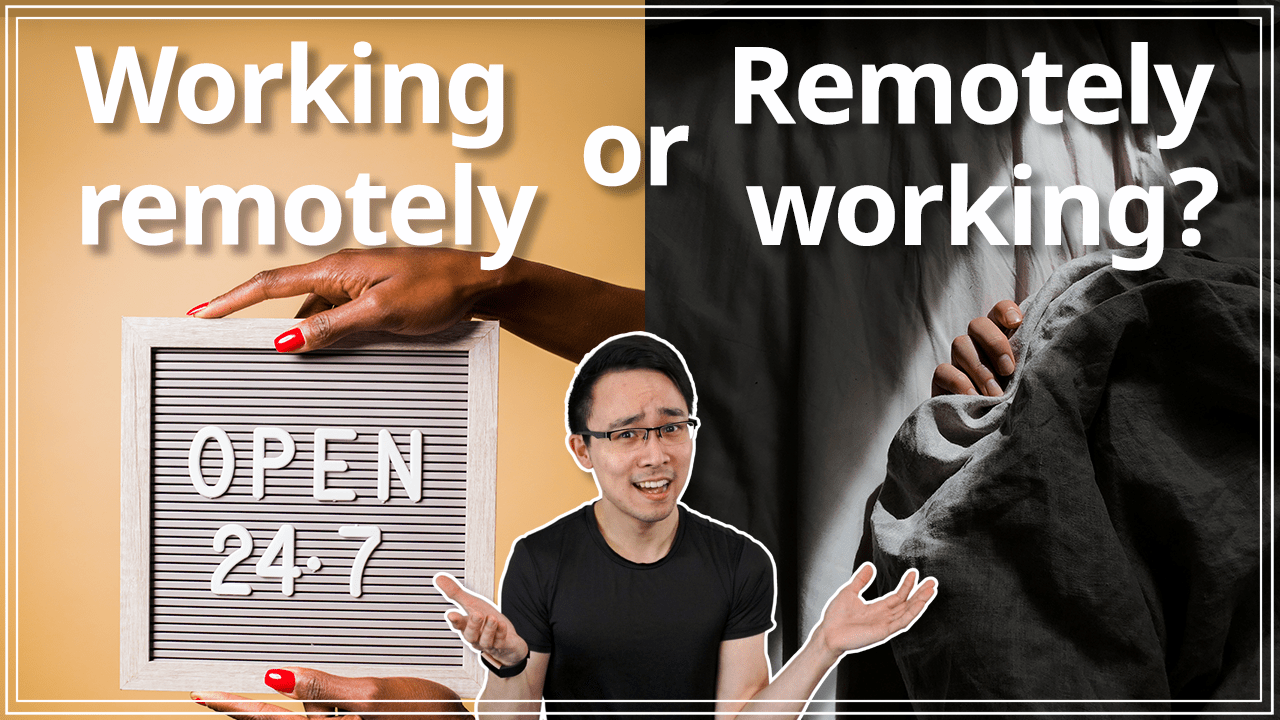Global situation has fundamentally changed the way that we work. Now, more than ever, people are prioritizing flexibility in their work more than compensation. And one of the ways that they are fulfilling that need for flexibility is by working remotely.
In this article, I’m going to share with you my personal experiences of the good and the bad to working remotely for over the past year, as well as three questions that you should ask yourself when considering whether or not remote work is good for you.
The Good About Working Remotely
1. One of the best parts about working remotely is that it completely eliminates your daily commute. I don’t know about you, but I hated the 30 to 45 minutes that I’d spend going both ways to and from my office. And now that’s completely eliminated. So on a monthly basis, I’m saving at least 20 hours every single month, then I’m then able to spend in other things that I actually care about.
2. Flexibility and lifestyle has also been a strong suit of working remotely. I pretty much start and end my days whenever I want. And I have coworkers that are in all different time zones. And so we’re able to make it work because our company is supportive of the flexible schedules. That being said, you will have to find a boss and or a company that is supportive in this same way, but it is something that generally speaking remote first companies are big proponents of.
3. Aside from just having home-based flexibility, another pro of working remotely full time is that I can always change up my setup whenever I want. I can go to a coffee shop if I want to work over there. Or I can just go to a different place and hang out there for a week or so in an Airbnb then have to stay in my home the entire time when I’m working.
This can be great if you have some good friends in other cities than where you currently live, and you just want to hang out with them for some prolonged periods of time, or just check out other cities that you might be interested in moving to in the future. Another great part of the flexibility is that if I ever need to run an errand in the day, I don’t have to think about it creatively from the context of how to achieve that errand close to my office. Instead, I know where everything is in my neighborhood. And so I can get things done faster.
This also makes it a lot easier for me whenever I have a dentist or a doctor’s appointment in terms of just scheduling and being more flexible to my respective doctors offices. If you enjoy working in your pajamas or the thought of doing so, hit that like button below.
4. Last thing that I’d say has been a big pro of working remotely has been that it has really opened up the opportunity for me to get to know my neighborhood better. Instead of just supporting downtown shops when I go out to eat for lunch or something like that, I’m able to shop at local mom-and-pop stores, which helped the local economy as well.
The Bad About Working Remotely
Now we’ve gone over the good of working remotely. It’s only fair that we shift gears and talk about what’s bad about working remotely.
1. The first thing that I’d bring up is that you really don’t get the same level of water cooler talk that you might be used to in a traditional workplace. Since working remotely for a remote-first company as well, I’ve noticed that it’s a lot harder to form naturally strong connections and relationships with my coworkers than it was in my old workplace, in which we had an actual in-person office we could meet up then.
The biggest reason why this is, is because in most situations when you’re working remotely, you’re going to be so focused in on your work that you’re not going to have as many natural opportunities to just take a break and hang out with a few of your coworkers in the office.
What this means is that you have to be a lot more intentional when it comes to forming meaningful relationships at work in a remote-first company. Something that my company does now is we essentially carve out a half hour at the end of our all hands, every single week to talk about high, lows, kudos as well as gratitudes for each other that we want to share with the rest of the company.
This allows us to connect with each other and learn more about each other’s personal lives, as well as the typical things that might come up in regular water cooler talk. Typically, the way I’ve seen remote-first company is bridged this gap is to have some off-sites or some retreats in which employees will all fly to an area and meet up together and spend that in-person time together. Honestly, though, there really isn’t a great all-in-one solution for this. This is simply a trade-off that you will have to come to grips with if you decide to work full-time remotely.
2. Another thing that I’d mentioned about working remotely is that it’s a lot harder to get onboarded in a remote environment than it is in an old-school approach. The reason why is because if you’re just the type of person that likes more in-depth overviews in your first few weeks on a job, you’re not going to have the same feedback cycle and availability of your immediate manager to walk you through everything. So what this means is that you’re likely going to spend a little bit more time in trying to bridge that gap of not having that in-person time to go over questions that you may have had before onboarding.
I’ve onboarded a number of team members and noticed that those that have just recently graduated and don’t have a lot of experience in the workforce tend to have a longer adjustment period when it comes to working remotely because they still have to learn exactly how to even work in a productive sense and also manage their daily to do’s.
3. A third drawback that I’d mentioned about working remotely is that there’s a less of a separation between your work life and your personal life. Mainly because you mainly work from home. And so what that means is that it can be a lot harder for you to turn things off. When you’re working remotely, you don’t get that same visual cue that you have back in the office when you notice people are leaving and so it’s time to go. Instead, you can end up working even longer hours because it’s harder for you to turn things off.
It can also mean in other cases, when people are all working longer hours, that they respect your boundaries less when it comes to slacking you late at night, a certain message or request of theirs that they need you to get done. Something that I’ve personally done to help me with combating this sort of tendency of working more is to simply separate my work office from where I actually sleep. Just having my bed in a separate room allows me to have that clear separation between when I’m on and when I’m off when it comes to work.
4. The last thing I’d share about working remotely full-time that is a drawback is that I have personally found myself sitting a lot more than I did back in the office. Back in my office, it was a lot easier to move around because I’d be running into different meetings throughout the day. And I also had a standing desk setup, which I’m still currently working on with my current setup at home to have that same standing desk support.
That said, though, something that I have done to level up my at home setup is getting this chair, which has been great in terms of just supporting my lower back a little bit more. But it is something that I would tell you to keep an eye out for when you start to work from home is make sure that you have an ergonomic setup that doesn’t put too much stress on your body when you’re working for so many hours in front of your computer.
3 Questions to See if Working Remotely is Right for You
Now that we covered both sides of working remotely, I want to cover three questions that you might find helpful in asking yourself in determining whether or not remote work is good for you.
- On a scale of one to 10, how independent do you feel you are as a worker?
In the case where you rank yourself as seven or above, I would say that you probably aligned pretty well to working remotely. However, if you rank yourself lower than that, I would say that you might want to consider some of the drawbacks to working remotely, especially when it comes to your first six to 12 months in a remote job
2. If you had to choose, you would consistently rank preference for flexibility over friendships or professional network nine times out of 10?
The reason why I say this is because, like I mentioned earlier, work relationships are a lot weaker when you’re working remotely, as opposed to going to an old school office. And so this is something to consider in which if you really valued having friendships with your coworkers and things like that, you have to either decide to be really intentional in how you’re going to build that in a remote world or prioritize those sorts of traditional office places.
3. On a scale of one to 10, how self-motivated would you consider yourself?
If you give yourself a seven or above, I would say that remote work is potentially great for you because you’re going to have that autonomy to set your own goals and work towards those goals. However, if you require something in which you like having a manager that checks in pretty regularly with you, that you can go to with feedback and have a pretty immediate feedback cycle with, then you might actually prefer to not work remotely and go more into a traditional workplace.
If you liked this article, be sure to check out my YouTube channel to get new videos every single week. I’ll help take you from zero to self-starter as you grow your business, get more customers, and hone your business acumen. Also, feel free to share this with anybody that you think might benefit from learning what it’s really like to work remotely in tech and whether or not remote work is for them.

